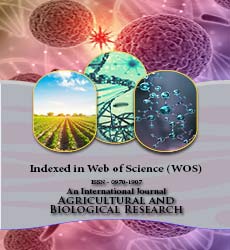Agricultural and Biological Research
RNI # 24/103/2012-R1
Kebede Manjur, Gebrehiwot Woldegebrial, Moges Girmay Phogella* and Workie Sahlu Anbaw
Introduction: The livelihood of rural households in Ethiopia depends on subsistence and rain-fed oriented agriculture. However, erratic rain and prevalence of drought in the country make agricultural production a challenge. To counter this problem, use of the available water resources for irrigation development is the most promising option.
Objective: Therefore, this study examines the impact of small-scale irrigation on household food security in Emba Alaje district of southern Tigray zone, Tigray regional state.
Methodology: A multi-stage sampling technique was employed to select sample households. The study was mainly based on the primary data that were collected from 137 randomly selected rural households (67 irrigation users and 70 non-users) from 2 kebelle of the district. The data were analysed using both descriptive statistics and econometric models. Descriptive statistics was used to characterize the sample of socio-economic and demographic status of households and propensity score matching techniques model were used to analyse the impacts of small-scale irrigation on specific food security outcomes.
Results: The Average treatment effect on treated result shows that participation in irrigation has positive impact on household’s income, food availability, food variety score, household diet diversity and calorie intake.
Conclusion: Therefore, the study concludes that small-scale irrigation development would have positive effect on food security of beneficiary households.
